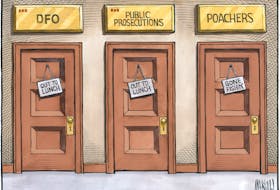Victims of oppression by Iranian authorities called on Canada Thursday to impose sanctions on 19 Iranian officials, and to follow the United States by listing the country’s Revolutionary Guard as a terror group.
The press conference in Ottawa was the latest effort by former attorney general Irwin Cotler, chair of the Raoul Wallenberg Centre for Human Rights, to seek justice on behalf of people, often Canadian dual nationals, who have been used as diplomatic leverage by Iran’s leadership.
They include the infamous Canadian cases of Zahra Kazemi, a photographer tortured to death in 2003; Homa Hoodfar, an anthropologist imprisoned for four months in 2016; and Saeed Malekpour, an engineer from Victoria, B.C., imprisoned in Iran since 2008 for corrupting Iranians’ morals.
“This has become a part of Iranian diplomacy,” said Richard Ratcliffe, whose British-Iranian wife Nazanin Zaghari-Ratcliffe, a charity worker, has been imprisoned for more than three years.
“We want you to sanction all the oppressors,” said Masih Alinejad, an exiled Iranian journalist, author activist and founder of the White Wednesday campaign for women’s freedom.
“When Iranian women are fighting back the oppressors and oppressive laws, they do not hesitate to raise their voices,” Alinejad said. “They risk their lives because they know freedom is not free.”
She was joined by Shaparak Shajarizadeh, who was sentenced to 20 years for leading protests for women’s rights, and was granted asylum in Canada with her son.
“The Canadian government can play an important role in supporting us,” against the “mafia regime” of Iran’s theocratic dictatorship, said Maryam Shafipour, who served several months in Iran’s notorious Evin Prison and was sentenced to seven years for political activism, but released early in 2015.
Cotler said the problem has lately intensified along with the “global resurgence of authoritarianism,” and it represents an “unprecedented assault on human rights in Iran amidst a culture of impunity.”
“We need to make the question of the massive domestic repression in Iran a justice and foreign policy priority on each of our government agenda as a matter of principle and policy,” Cotler said.
In an interview, he emphasized that the goal is not sanctions on the Iranian people, but rather against the corrupt “architects” of human rights abuses “on behalf of the Iranian people.”
The 19 men identified in the Raoul Wallenberg Centre report include Iran’s Ministers of Intelligence; Justice; the Interior; Culture and Islamic Guidance; Information and Communications Technology; and Science, Research and Technology. They also include the Chief of the Law Enforcement Force, Prosecutor General of Tehran, head of the Basij militia, Chief Justice and various senior officials.
Cotler noted that, since passing the Sergei Magnitsky law in 2017 (named for a lawyer killed in detention in Russia), formally known as the Justice for Victims of Corrupt Foreign Officials Act, Canada has used it against officials in Venezuela, Russia, Saudi Arabia. In that company, Iran is a notable absence.
Cotler first urged the banning of the Iranian Revolutionary Guard Corps ten years ago as an MP. He said he has recently spoken about this with Foreign Affairs Minister Chrystia Freeland and Public Safety Minister Ralph Goodale, and he hopes the delay is down to “process.”
He said the speakers at the press conference offered the clearest and most compelling reasons and first hand accounts.
“I’m not aware of any reasons that should prevent the imposition of sanctions, unless there are some political or diplomatic considerations,” Cotler said.
In his foreign policy speech earlier this week, Conservative leader Andrew Scheer said that if he becomes prime minister he “will immediately act to list Iran’s Islamic Revolutionary Guard Corps as a terrorist entity, as well as make full use of the Magnitsky Law to punish Iran’s worst human rights offenders.”
Cotler was joined at the press conference by MPs of all the major parties, including Green leader Elizabeth May.
Also, this week, on Monday, U.S. President Donald Trump announced that Iran’s Revolutionary Guard has been listed as a foreign terrorist entity under American law, the first time the designation has been applied to a part of another country’s government.
Canada lists the Qods Force, the foreign wing of IRGC, as a terrorist organization, but not the IRGC in general.
• Email: [email protected] | Twitter: josephbrean
Copyright Postmedia Network Inc., 2019








